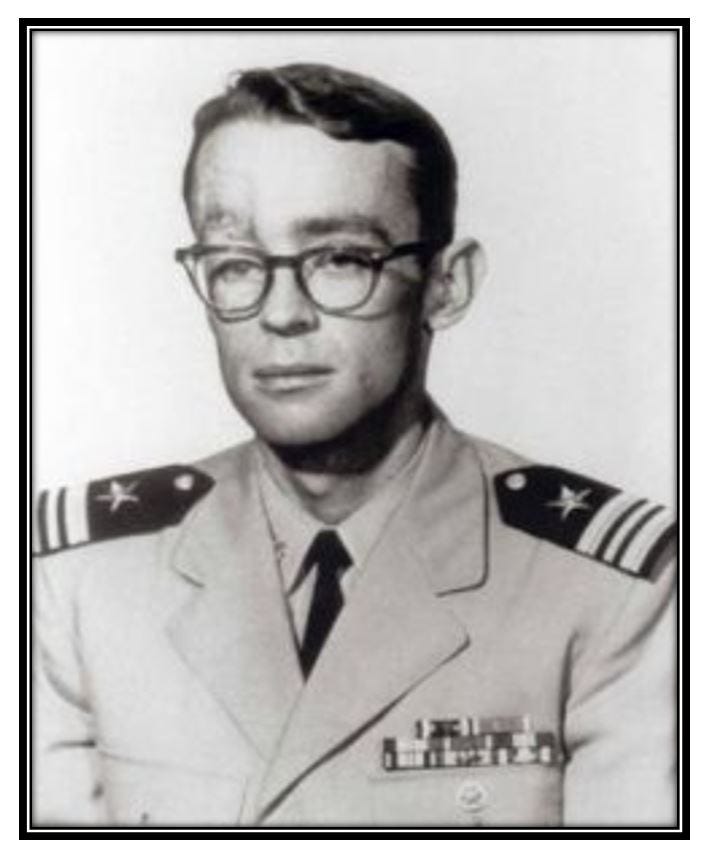Medal of Honor Monday: Thomas Kelley
“My primary thoughts were, we gotta do something to protect those folks on the beach,” Kelley described. “They were kind of sitting ducks."
At about this time in 1969, a United States Navy lieutenant engages in an action that would earn him the Medal of Honor. Thomas Kelley had joined the Navy almost on a whim: He was about to graduate from Holy Cross College when he discovered that some of his friends were joining the Navy.
Kelley figured he might as well join, since his “two pals” were. He was soon serving in the Navy, enjoying it so much that he decided to make a career of it.
By 1966, he was serving off the shores of Vietnam, away from combat. But he would soon volunteer for more dangerous duty with the River Assault Division. In that capacity, he would insert troops, provide fire support while they were ashore, and extract them afterwards.
An especially challenging mission came on June 15, 1969, as Kelley led eight vessels into a difficult river pass.
The day began well. Kelley and his men inserted troops at multiple points along the river, picked them up, and then took them to a new spot to insert them again. Navy helicopter gunships were nearby, providing support. But things got tougher as Kelley moved deeper into enemy territory.
“[W]e kind of knew we were telegraphing our movements, I guess,” he later told an interviewer, “they already knew we were coming. And then we didn’t have the support.”
Trouble came as the American vessels attempted to extract a company of troops from the east bank of the Ong Muong Canal in Kien Hoa province: A loading ramp on a troop carrier malfunctioned. Men began working to get the ramp up by hand, but the boat was left stranded in the meantime.
Unfortunately, the Viet Cong chose that moment to open fire. “All hell kind of broke loose,” Kelley said. He directed most of his assault craft to create a protective circle around the disabled vessel. But still more would be needed.
“My primary thoughts were, we gotta do something to protect those folks on the beach,” Kelley described. “They were kind of sitting ducks. They didn’t have the fire power we had. They really couldn’t defend themselves as well as we could.”
He directed his own vessel—an armored monitor—around the circled American boats, placing himself between the disabled vessel and the enemy. The monitor began firing.
Unfortunately, a round soon came in, detonating 6 inches from Kelley’s head. He was thrown to the deck of the monitor.
“I could hear one of my men right in the boat there saying, he’s dead, talking about me. And I can remember clearly saying ‘no, I’m not, no I’m not.”
Kelley couldn’t believe what had just happened. Had he really been hit?
But don’t you know that a little thing like a blow to the head wasn’t going to stop him? “I suppose the adrenaline starts flowing and stuff like that and you really start doing what you are trained to do,” he concluded.
Kelley’s Medal citation describes the moment: “Although unable to move from the deck or to speak clearly into the radio, he succeeded in relaying his commands through 1 of his men until the enemy attack was silenced and the boats were able to move to an area of safety.”
At one point during the battle, another boat pulled alongside Kelley’s vessel. A Navy Corpsman came aboard and stabilized Kelley, even as Kelley kept issuing commands.
“Without him, I would haven’t have made it,” Kelley later said.
Later, after the boats made it to a safer location, Kelley was evacuated and taken to a field hospital, where he lay in a coma for several days. He’d lost an eye and shattered his skull—but he survived and received his Medal of Honor in person about a year later.
“There are probably thousands and thousands of [those who have fought] who deserved to get what I got,” Kelley said of his Medal, “and just because nobody saw it or nobody took the time to document it, they were left out. And so I kind of wear it thinking of them also and all those who have served.”
Sources can always be found on my website, here.





Lt. Thomas Kelley seems to be like many MOH awardees, he wears his Medal in honor of all who served and especially for those whose brave actions were not seen or documented.
Lt. Kelley, though severely wounded, continued issuing commands until the situation was safe. Such a brave man and such a great American Hero.
Thank you Tara for another MOH Monday.
Wow! Such humility! This seems to be so common a trait with the caliber of person who receives this recognition. Either something happened in their experience or they were humble to start. Much gratitude goes out to this great American.